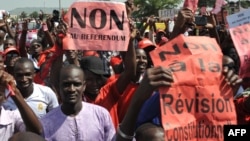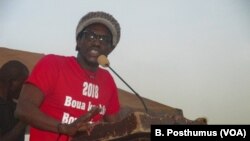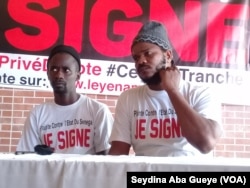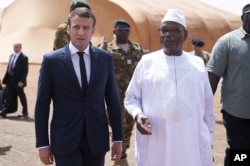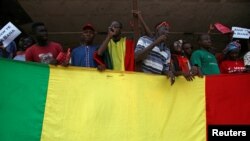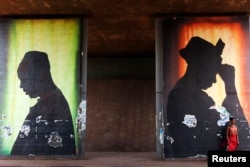This year, Malians will vote in nationwide elections amid discontent over continued insecurity and poverty. Popular anger has found a focal point in a diminutive figure who goes by the name of Ras Bath. Without running for office himself, Ras Bath is an influential figure to watch.
Mohamed Youssouf Bathily, who everybody calls Ras Bath, addresses a rally in Mali's second city, Sikasso.
With jokes and anecdotes, he paints a picture of how he says Mali's ruling class holds on to power and perks. Mali's elites don't like it one bit — but the people can't get enough of his speeches.
So how did the son of a government minister become the voice of the poor?
The answer to that question lies next door in Senegal.
Ras Bath went to Dakar in 2010 for law school. He met the Senegalese rapper Fadel Barro, who was about to start a popular movement against that would usher then-president Aboulaye Wade to defeat in the 2012 elections. This became "Y'en a marre," or "We're fed up."
"Y'en a marre" went on to inspire Balai Citoyen in Burkina Faso, which helped chase away that country's long-time ruling elite in 2014. Is Mali next? Yes, says Ras Bath.
"We have tried everything," he said. "We had empires, we had colonialism, and then we had one-party rule and military rule. We have chosen true democracy, with freedom of conscience, freedom of opinion, freedom to form associations and political parties. But this democracy has been hollowed out. We need to shake things up for it to get better."
He set up a citizen's movement called Collective for the Defense of the Republic, or CDR, in 2013. CDR organizes the mass rallies where he speaks.
He also started a radio program, "Cards On The Table," in 2014.
Live on air, Ras Bath discusses the problems of ordinary Malians, exposes corruption scandals and calls on government ministers to resign. Unheard of in a country where politeness could be said to be part of the national DNA.
And indeed, his critics say that he is too abrasive, too confrontational. As the local saying goes: "Tell the truth — but do it gently."
Ras Bath was arrested in August 2016, a move that provoked violent riots in Bamako. The charge was inciting the army to disobey orders. The Court of Appeal threw out the charge in November of last year.
The activist remains unapologetic.
He says his slogan is "choquer pour eduquer" ("shock, in order to educate"). Ras Bath wants Malians to change their thinking about government.
"Through our taxes, we pay the police to protect our homes, we pay our representatives to keep an eye on the government and we pay the president to rule for the good of us all," he said. "Judges, lawmakers, presidents are not your masters; they are here to serve you."
He says these are new ideas in Mali, where authority is revered and rarely questioned.
Few expect a major upset in the upcoming elections. However President Ibrahim Boubacar Keita is criticized for not doing enough to remove armed terrorist groups from the country and to root out the corruption and bad governance that plunged Mali into crisis in 2012.
Malians have taken to the streets to express their discontent, last summer forcing President Keita to abandon efforts to change Mali's constitution. In the last two months, it was violence against women that brought people out on the streets in protest.
Civic activism is expected to play a major role in elections this year.
A new song, by the up and coming protest singer Soldat, or Soldier, features Ras Bath's famous slogan: "bua ka bla." It means: "take a rest." A clear message to President Keita, who at 72 seeks re-election.




